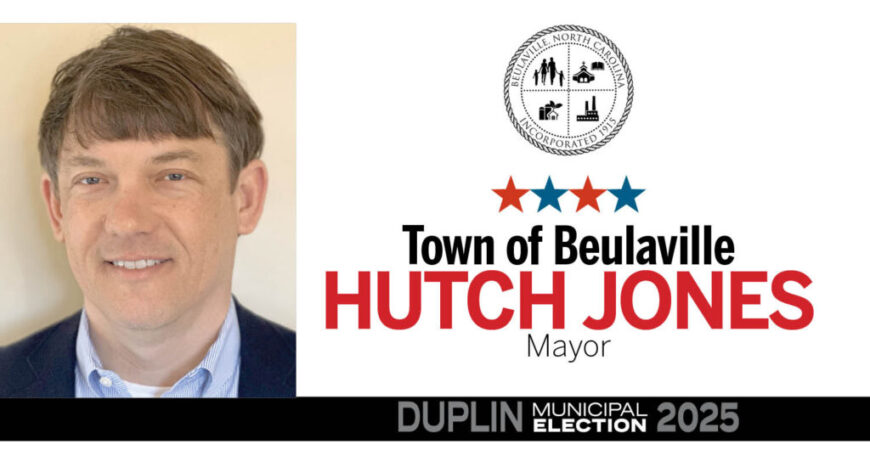Election Q&A series | Beulaville
Incumbent Mayor Hutch Jones
In this Q&A, Mayor Jones reflects on his time in office, highlighting Beulaville’s strengthened financial position, infrastructure upgrades, and efforts to balance growth with affordability and small-town character. As he seeks a third term, he outlines his vision for the town’s future, including priorities like economic development, community wellbeing, and responsible planning. The answers below are excerpts from Jones’ full interview with Duplin Journal, shared here in a condensed format due to print space limitations. The full interview, with complete responses and additional details, will be available online.
Reflecting on your time in office, what accomplishment are you most proud of and how has it tangibly benefited the community?
I was first sworn in as Mayor of Beulaville in December 2017 and am currently on the ballot for my third consecutive term, which begins in December 2025. Throughout my tenure, I’ve had the privilege of working alongside a consistent and dedicated board. Having nearly the same board members throughout my time in office has been a tremendous asset—it’s allowed for continuity in leadership, a shared vision, and efficient decision-making. That kind of stability has really helped us move the town forward in meaningful ways.
There are many accomplishments I’m proud of, and I hope our residents can see the progress we’ve made when they drive through town. While some improvements are clearly visible—like updated facilities or infrastructure—others are less obvious but just as important.
First, our financial health: The Town of Beulaville is as financially strong as it has ever been. We’ve worked hard to ensure solvency and long-term stability.
Second, we’ve positioned the town for future growth. In an ever-changing state and national landscape, we’ve laid the groundwork to ensure Beulaville can adapt and thrive.
And third, our infrastructure: We’ve secured grants and leveraged outside funding to make much-needed updates that directly improve the safety and wellbeing of our community.
We still have more to do, but I believe the results of our work speak for themselves.
Looking ahead to your next term, what are your top three priorities for Beulaville? How do these priorities directly address the concerns and needs you’re hearing from residents?
It’s difficult to narrow our focus to just three priorities because, like any organization or business, the Town of Beulaville has many moving parts, and priorities can shift depending on the needs of the moment. That said, three ongoing areas of focus are:
Economic Development, Community Development, and Navigating Inflation and Economic Pressures.
At the heart of all of these is one constant: fiscal responsibility. Since taking office, maintaining a sound budget has been our top priority. A responsible budget isn’t just a financial document — it’s a tool that helps us decide what’s possible, what’s sustainable, and what must be prioritized. It guides every project we take on.
Economic development and community development are always interconnected. We’ve worked to position Beulaville for sustainable growth—bringing in new opportunities while also investing in the needs of our residents. Managing that growth has not been easy, especially considering the challenges we’ve faced over the years: Hurricane Florence, the COVID-19 pandemic, and now record inflation.
Through it all, our board, town manager, and my office have remained focused and unified. We’ve continued to move the town forward while staying within our means — reducing debt, applying for grants, and investing in infrastructure and quality of life improvements without compromising our financial integrity.
These priorities reflect what we hear from our residents: they want a town that’s growing but not overextending; one that’s improving but still affordable and safe. We’re committed to that balance, and we’re delivering on it.
Beulaville is leveraging state and federal grant programs to make long‑needed infrastructure and housing improvements. What’s your administration’s long-term strategy for identifying, applying for and managing grant opportunities?
Our long-term strategy is to do exactly that: create a long-term plan to develop and grow the Town of Beulaville. We are embracing growth and development as much as we can. We are currently working with a number of developers to continue to expand the city limits of Beulaville through voluntary annexation and pursuing opportunities to develop additional water and sewer projects outside of our city limits to add to revenue opportunities for the town.
While major infrastructure upgrades are underway, residents have experienced issues like water outages and poor drainage. What short-term solutions are in place while long-term projects are underway?
We take outages, poor drainage, and any hazardous conditions very seriously. Our goal is always to minimize disruptions while continuing the work necessary to improve our town’s infrastructure for the long term.
Our administrative team, along with our police and public works departments, work closely to explore all available options to reduce the impact on residents. That includes planning work during lower-demand times, providing timely updates, and responding quickly to any issues that arise. Communication with the public is a top priority — we want residents to be informed and feel supported when these temporary inconveniences occur.
That said, some of the short-term issues we’re seeing — such as water outages — are directly tied to the larger improvement projects currently underway. These are complex upgrades that are essential to the town’s future. The good news is that our team has done an excellent job securing state and federal grants to fund these critical water and sewer improvements, and we’re proud to report that one of our largest infrastructure projects is now wrapping up ahead of schedule.
We understand the frustration that can come with disruptions, but we’re confident that the long-term benefits — improved reliability, better drainage, and a more modern utility system — will serve our community well for years to come.
With real estate demand rising, housing affordability may soon become a challenge. What is the town doing now to ensure that current and future residents, including young families, seniors, and essential workers, can continue to afford to live in Beulaville?
We recognize that rising real estate demand can quickly lead to affordability challenges, especially for young families, seniors, and essential workers. That’s why we’re being proactive in planning for balanced growth and working to ensure that Beulaville remains a place where people from all walks of life can afford to live.
Since I took office, zoning and code enforcement have been a top priority. We’ve worked hard to update and strengthen our zoning regulations to support responsible development while also protecting the character and affordability of our community.
Our administration is actively involved in conversations with developers, planners, and county and state partners to encourage a range of housing options. We want to ensure that as Beulaville grows, we are not just building — but building smart. That means supporting developments that include affordable housing options and making infrastructure decisions that reduce the cost burden for future residents.
We are committed to staying at the table, having a voice in these decisions, and shaping growth in a way that keeps Beulaville both livable and welcoming for all.
How is your administration using zoning policies and temporary development moratoriums to manage growth while preserving Beulaville’s small-town character and quality of life?
Our administration is committed to managing growth in a way that aligns with Beulaville’s values and preserves the small-town character that makes our community special. Zoning policies and, when necessary, temporary development moratoriums are tools we use to ensure development aligns with our long-term vision.
Most recently, our Board and I enacted a temporary moratorium on the development of additional vape shops within town limits. To my knowledge, we are the first municipality in the county to take such action. This decision wasn’t just about one type of business — it was about sending a clear message regarding the kind of community we want to build.
Actions like this reflect our broader strategy: to be intentional about growth, protect the health and wellbeing of our residents, and reinforce Beulaville as “a place to come home to.” We will continue using every tool available—zoning, planning, and public input—to guide development in a way that enhances quality of life while preparing for a strong future.
Given historically low voter turnout and a lack of electoral competition, how do you interpret this pattern?
Unfortunately, this isn’t just something we’re seeing in Beulaville or Duplin County — it’s part of a larger national trend, and it’s concerning. I try not to spend too much time interpreting the numbers, but I do reflect on what they mean for me, my family, and the community I serve.
My hope is that the work we’ve done speaks for itself and builds trust with residents. At the same time, I genuinely encourage more people to get involved — whether it’s through local government, their church, a school, a nonprofit, or simply by lending a hand to a neighbor.
Change doesn’t always start at the ballot box. Sometimes, it starts by stepping up, showing up, and doing good where you can. I welcome anyone who wants to contribute to the future of Beulaville — and I believe our community only gets stronger when more voices are heard.
Also running for reelection in Beulaville:
Commissioner Gene Wickline
Commissioner Delmas Highsmith
 Twitter
Twitter Facebook
Facebook Instagram
Instagram






